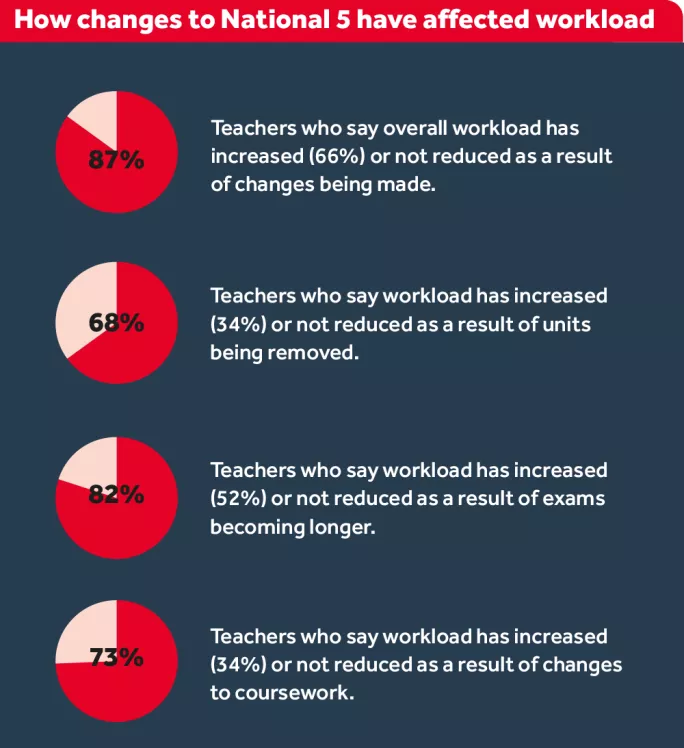Workload stress surges as N5 changes backfire

Most secondary teachers believe changes to National 5 designed to decrease workload have backfired, according to a new survey. Many also fear the changes have added to staff and pupil stress, with some teachers saying they are the tipping point that may force them to leave the profession.
At the annual conference of the Scottish Secondary Teachers’ Association (SSTA) in Crieff last Friday, general secretary Seamus Searson revealed top-line findings from a survey of 1,266 members to an audience including education secretary John Swinney. The SSTA has now shared more detail of the survey with Tes Scotland, including comments from 634 respondents.
A phased removal of unit assessments at N5 to Advanced Higher started with N5 this year, but 87 per cent of teachers say workload has not yet decreased as a result; 66 per cent say it has actually increased. A majority also report increases in pupils’ workload and stress levels.
In September 2016, Swinney announced that he would accede to teaching unions’ demands and scrap unit assessments, following complaints that they duplicated other work on Scottish Qualifications Authority (SQA) courses - although he later revealed the assessments would still be offered temporarily, to provide a fallback for students who might struggle to gain a full N5 without them.
One teacher who responded to the survey captures the mood of many: “I don’t know how long I can continue with this as the workload is unbearable and the goalposts keep changing - it is not fair on the pupils and teachers. There was nothing wrong with the old system of Standard Grades, Intermediate 1, Intermediate 2 and Higher.”
Others complain of unintended consequences amid fears that removing unit assessments will leave N5 pupils without a “safety net”. One teacher says: “Some schools have opted for presenting all their pupils at N4 maths as well as the freestanding unit of numeracy at N5. This has caused undue stress for teachers and has not tackled the issue of bureaucracy at all.”
Others see merit in the revised N5 arrangements in principle, if not necessarily in practice. One biology teacher says: “The changes are good and needed, but not enough time is given for implementing these changes. What most people forget is that teaching a full timetable is already a full-time job [and] any extra work generated by the SQA requires me to use my personal time … Fortunately, I will likely be able to retire early at Christmas - the long hours are affecting my health.”

Searson says: “SSTA predicted that teacher workload would not be reduced and that [the changes] would put additional pressure on teachers and pupils. We are creating examination factories, not places of learning where happiness is seen as a good and valued thing.”
He adds that workload has simply “spread to other parts of the qualification process”.
In 2017, Tes Scotland revealed that the removal of unit assessments at N5 - which will be implemented at Higher next year and at Advanced Higher in 2019-20 - would lead to new and longer exams for most subjects (“High-stakes exams making a comeback, Scottish teachers warn”, bit.ly/ExamComeback). Earlier this year, we reported that more than 14,000 Scottish pupils were continuing to sit unit assessments (“Thousands of Scottish pupils still sitting tests reserved for ‘exceptional circumstances’ ”, bit.ly/Exams1000s).
A Scottish government spokeswoman says: “Presenting pupils at the correct level of qualification to meet their educational needs is crucial for the learner and to avoid assessments becoming over-bureaucratic for teachers. Teachers were heavily involved in the development of Curriculum for Excellence and the changes to national qualifications, including the decision to remove unit assessments. These free teachers to teach and were welcomed by unions when announced.”
She adds: “The wellbeing of school pupils is vitally important and health and wellbeing is a key priority of the Curriculum for Excellence. Opportunities should be made available for every pupil to discuss any stress they feel and appropriate support [should be] offered.”
An SQA spokesman says that the removal of unit assessments was welcomed by teaching unions, and that the timelines for the changes were set by the government. The changes mean that “we need to strengthen course assessments to protect the integrity, credibility, breadth and standards of national courses”, he adds.
The spokesman continues: “The ways in which we have changed assessments have been carefully thought through and consist of a mixture of approaches. These changes vary subject by subject, with modifications to the question paper or coursework depending on what would have been assessed in the units.”
The SQA also says that the changes were preceded by “considerable engagement through our national qualification-support teams and through dialogue with teachers and the relevant professional associations”.
You need a Tes subscription to read this article
Subscribe now to read this article and get other subscriber-only content:
- Unlimited access to all Tes magazine content
- Exclusive subscriber-only stories
- Award-winning email newsletters
Already a subscriber? Log in
You need a subscription to read this article
Subscribe now to read this article and get other subscriber-only content, including:
- Unlimited access to all Tes magazine content
- Exclusive subscriber-only stories
- Award-winning email newsletters